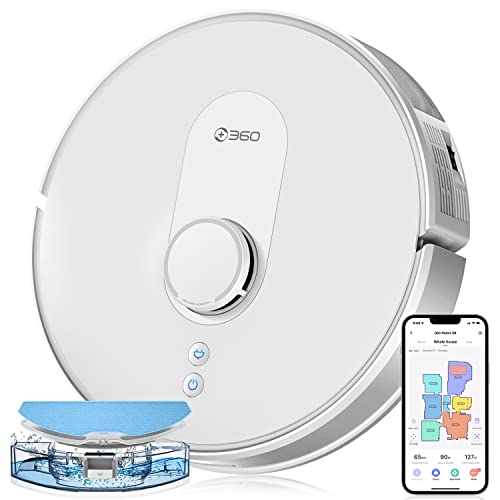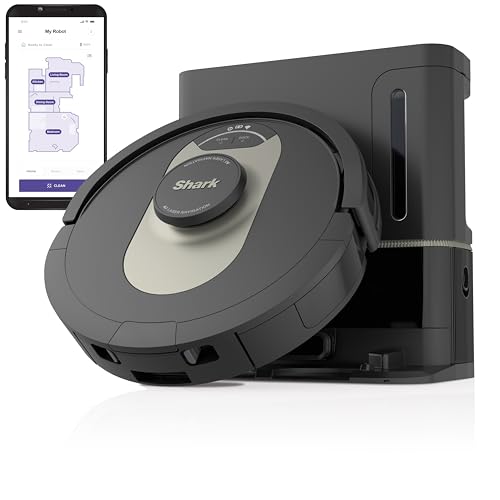11 Strategies To Completely Defy Your Robot Vacuum And Mops
페이지 정보
Eldon 24-06-02 18:28 view446 Comment0관련링크
본문
 Robot Vacuum and Mop - Hands-Free Cleaning Made Easy
Robot Vacuum and Mop - Hands-Free Cleaning Made EasyThink about this two-in-one cleaner if you want a cleaner that does it all. It mops hard floors and vacuums carpets with low and medium-pile carpets, and its app lets you design no-mop zones and adjust cleaning schedules and modes.
Find models with sensors that can recognize the kind of floor they're on and empty water and dirt from their own tanks and avoid obstacles such as phone chargers, pet hair and socks. Also, discover how easy it is to install.
Self-Emptying
As the world gets busier and more hectic People are always looking for ways to minimize their work load. Robot vacuums and mop are among the top tools on the market to aid in that. They can remove dirt, crumbs and pet hair while simultaneously scrubbing and wiping floors clean. You can also make use of a smartphone or voice assistant to control them via preset schedules and room designations.
Self-emptying models are a great time saver for both the user and the. It's not necessary to empty the bin every time you clean. This saves you time and effort and which robot Vacuums are the best allows your robot to clean your whole house more often, and not have to worry about running out of room in the bin before it's time for refills.
If you are considering an auto-emptying model make sure you check the size of the trash bin, as it can quickly fill up if it is used regularly. Also, you'll want to make sure the system won't overfill, causing obstructions that prevent the robot from being able to empty it fully.
The self-emptying feature works by taking the dust bin that is inside the machine and putting it in an additional storage containerThink of it as a bag on a traditional vacuum cleaner -which can be empty every two or three times. These robots are well worth the extra cost since they have this premium feature.
To perform the mopping function Some models wash and dry their own dirty pads after every use. Some models have docks that does the job for you and you only need to empty it once or twice per year.
If you're looking for a single-function robot that can do both, check out the top-rated Roborock model. The RockDock-S7 MaxV Ultra can vacuum and mop, with a special dock that does all the maintenance for you. It's not necessary to empty the tanks manually and you can program the unit to start with on-device controls and voice assistants such as Alexa and Google Assistant. It comes with boundaries that prevent it from wandering into other areas of your house even if you don't want it to.
Object Avoidance
The best robot vacuums (they said) feature object avoidance, which helps the machine maneuver around furniture legs and stray children's toys. This feature is essential for families with pets and children, as the robot will stop or break if it bumps into them.
The method is typically based on a single or couple of sensors situated close to the shock-absorbing bumpers of the vacuum. When sensors detect a roadblock the robot will reorient and turn until it finds an open path. Certain models employ lidar technology, which uses lasers for measuring the distance between the robot and the surrounding objects. This allows it to build a map of its surroundings in real-time and move more efficiently around your home.
Other robovacs that don't use lidar technology are built to utilize binocular or monocular vision to recognize obstacles using cameras. These systems are most effective in bright light however they don't perform better in low light or with objects that have the same color as the environment. For instance, a robot with monocular vision will have trouble seeing shoes or cables.
Certain advanced robot vacuums can be more than just avoiding obstacles, which is the reason they're also called smart vacs. They can create an imaginary map of your home's layout and allow you to direct them to specific rooms or areas using the application. They'll even remember where they have already cleaned which will help reduce time spent cleaning and ensure that your home is spotless.
The most advanced robotic vacuums and mops can switch between different kinds of flooring. Some robot vacuums and mops will automatically detect the flooring type in a particular room and adjust the suction and brush functions in accordance with. Some will even switch from carpet to hard flooring without losing suction power.
All smart vacuums and mops must feature some type of obstacle avoidance, irrespective of the type of flooring. These mechanisms ensure that the devices don't get caught in an electrical wire web, which can cause them to lose suction. Some models have a list of items they are aware of for example, socks, shoes and pet waste. The best models can recognize these items and determine their dimensions, distance, and how to avoid them without getting into it.
Floor Mapping
Most robot vacuums come with sensors that help them detect objects. If an object -- like furniture legs or a random toy is thrown in the way, it triggers a sensor that tells the vacuum to move away from the obstruction and toward a cleaner part of the floor. However the sensors aren't 100% reliable. For example the Roomba 900 Series was able to stay clear of our shoelaces and wired headphones, but it accidentally took in a USB cord. For this reason, we advise removing any objects from the robot's path prior to guiding through your home's rooms.
Many of the mopping and vacuum robots we've tested in The Spruce include an app. You can use it to save maps, create schedules, choose cleaning modes and track your robot's performance. The best apps offer features that can improve the efficiency of your robot. They are user-friendly and simple to use.
App integration lets you keep the track of the water tank and dirty pads on your robot. Find models that allow you to check the level of filling in the tank and how much the pad is soaked and when it's time to change the pad. You can set up a schedule that automatically changes the pad after it is wet to avoid mildewy odors building up.
Mapping is a crucial feature of robot vacuums that operate on multiple floors in the house. It lets the robots create a map of your house that they can use to navigate and clean different areas. Some robots employ sensors and artificial intelligence to create these maps. For instance, iRobot's Vacuuming Mapping uses multiple sensors to scan a room that includes walls and corners, to determine how far the robot can travel before it hits furniture or bumps into obstacles.
Other robots like the Ecovacs Deebot X1 -OMNI or the Roborock S7 MaxV Ultra use optical sensors to determine the location of walls. They can then use a mapping algorithm or follow the edges of furniture to determine the best way to travel through each room.
Mopping Settings
 Robot vacuums are automated vacuum cleaner, and you only need to push a button within the app or on the remote control to get them to clean a space. You can also make use of voice commands to create schedules which is a useful feature for busy families that would like their robot to complete its tasks at the same time every day.
Robot vacuums are automated vacuum cleaner, and you only need to push a button within the app or on the remote control to get them to clean a space. You can also make use of voice commands to create schedules which is a useful feature for busy families that would like their robot to complete its tasks at the same time every day.Most robot mops use microfibre pads that are soaked using water tanks in their base, and many can be used multiple times before having to wash or replace the pad. You should look for models that alter the amount of water dispensed to suit different types of floors. You'll also want to think about the size of the tank, whether you can change the cleaning mode between dry and wet mopping and how long a robot mop will last on a single charge.
The most effective robot mop mops are able to clean floors quickly and efficiently even under tables and around obstacles. They're not perfect, however they can be difficult to climb and descend the stairs or over ledges which separate rooms. They can leave streaks of timber or tiles, particularly in sunlight.
A good quality robot vacuum and mop ought to also have a sensor that can detect and avoid carpet. This is essential when you live in a home with floors of different types and the robot will not be able to get caught in or over rugs. It should be able to identify other objects that could hinder cleaning, such as cords and tassels. This allows you to create "no-go zones" that will prevent the robot from accessing these areas.
The majority of the robots we test in the CHOICE lab have smart app integration that lets you save maps of your home as well as schedule cleaning times and choose cleaning modes. You can also set up virtual barriers to prevent your robot from certain areas, and receive (sometimes amusing) warnings of errors if the device runs into problems. Certain apps are more user-friendly than others, and some provide a live webcam for monitoring of your robot.
댓글목록
등록된 댓글이 없습니다.